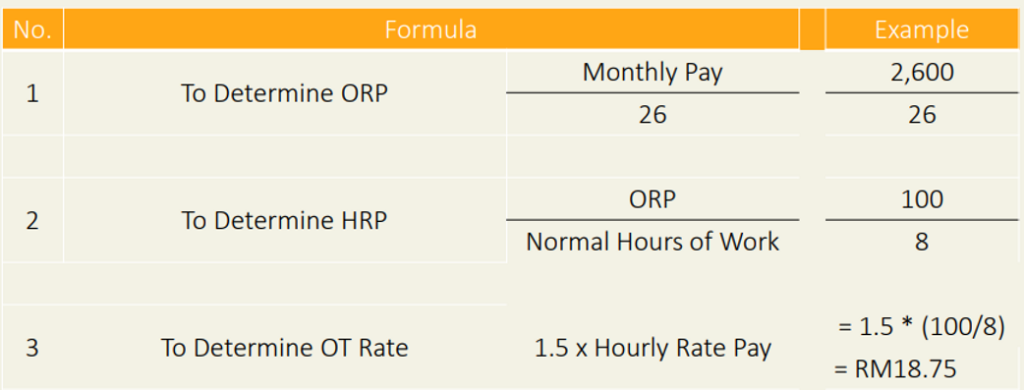In the context of Malaysian employment law, overtime refers to the hours worked by an employee beyond their regular working hours.
According to employment regulations, employers are required to compensate employees for the extra hours worked during overtime.
The compensation rate for overtime work is typically higher than the employee’s regular hourly wage.
Malaysian labour laws set minimum wage limits per hour, so overtime must be paid at or above these minimum wage standards.
Under the Employment (Limitation of Overtime Work) Regulations 1980 [Sabah and Sarawak Labour Limitation of Overtime Work Regulations], an employee can only be expected to perform 104 hours of overtime a month.
Any work carried out on a Rest Day, any of the Gazetted Public Holidays, or any paid holiday substituted shall not be construed as overtime work.
However, the Director-General may, on the application made to him in writing by an employer or by an employee or a group of employees, permit any particular employee, or any group, class, category, or description of employees in any particular industry, undertaking or establishment to work overtime in excess of the limit of hours so prescribed.
Overtime is usually calculated on an hourly basis, and employers are required to ensure that employees receive appropriate rest periods and compensation for their overtime work.
The statutory limit for regular working hours in Malaysia is 45 hours per week and 8 hours per day (* by agreement under the contract of service between the employee and the employer, the number of hours of work on one or more days of the week is less than 8, the limit of 8 hours may be exceeded on the remaining days of the week, but so that no employee shall be required to work for more than 9 hours in one day or 45 hours in one week).
For any additional work performed beyond the normal working hours, the employee is typically compensated at a rate not less than 1.5 times their Hourly Rate of Pay (HRP).
To determine the Hourly Rate of Pay (HRP), it’s essential first to understand what the Ordinary Rate of Pay (ORP) is.
According to Section 60I(1A) of the Employment Act 1955, where an employee is employed on a monthly rate of pay, the ordinary rate of pay shall be calculated according to the following formula:
= monthly rate of pay/26
Whereas 60I(b) defines the hourly rate of pay means the ordinary rate of pay divided by the normal hours of work.
For any overtime work carried out in excess of the normal hours of work, the employee shall generally be paid at a rate not less than 1.5 times his Hourly Rate of Pay (HRP).
Example:
- Ali’s monthly salary is RM 2,600.
- He works 8 hours a day, from Monday to Friday.
To calculate Ali’s ORP, divide his monthly salary by 26. This will give you RM 100.
To calculate Ali’s HRP, divide his ORP by 8. This will give you RM 12.50.

So, if Ali works for an extra hour of overtime, he is compensated at a rate of 1.5 times his Hourly Rate of Pay (HRP), which is RM 12.50.
Ali is entitled to RM 18.75 (RM 12.50 * 1.5) for work performed beyond his normal working hours.
However, his employer can pay at a rate higher than 1.5 times but not less than 1.5 times.
The overtime payment for an employee on a monthly pay basis differs for rest days and holidays:
- Rest Day Overtime Payment: If an employee on a monthly pay basis is required to work on their rest day, they are entitled to additional compensation.
- which does not exceed half his normal hours of work, wages equivalent to half the ordinary rate of pay for work done on that day, or
- which is more than half but which does not exceed his normal hours of work, one day’s wages at the ordinary rate of pay for work done on that day
- For any work carried out in excess of the normal hours of work on a rest day by an employee mentioned in paragraph (a) or (b), he shall be paid at a rate which is not less than two times his hourly rate of pay.
- Holiday Overtime Payment: If an employee on a monthly pay basis is required to work on a paid holiday, they are also entitled to additional compensation:-
- two days’ wages at the ordinary rate of pay, regardless that the period of work done on that day is less than the normal hours of work
- For this, they should receive their holiday pay for the day and, in addition, receive two days’ wages at the ordinary rate of pay for the work done on the holiday.
- This means they are paid twice their usual daily wage for hours worked on the holiday.
- For any overtime work carried out by an employee in excess of the normal hours of work on a paid public holiday, the employee shall be paid at a rate which is not less than three times his hourly rate of pay.
- two days’ wages at the ordinary rate of pay, regardless that the period of work done on that day is less than the normal hours of work
Example 1: Rest Day
Ali’s designated rest day is Sunday.
His normal working hours are from 9:00 AM to 6:00 PM, including a 1-hour lunch break.
Ali’s monthly salary is RM 2,600.
1) Ordinary Rate of Pay (ORP) Calculation:
Ali’s monthly salary is RM 2,600.
To calculate the ORP, divide his monthly salary by 26:
ORP = Monthly Salary / 26
ORP = RM 2,600 / 26
ORP = RM 100
Now that we have Ali’s ORP (RM 100), we can calculate his HRP.
2) Hourly Rate of Pay (HRP) Calculation:
Ali’s HRP can be calculated by dividing his ORP by 8 (the typical number of working hours in a day):
HRP = ORP / 8
HRP = RM 100 / 8
HRP = RM 12.50
Now, we’ll calculate the overtime payment for Ali based on your provided scenarios:
Scenario 1 – Ali Works on Rest Day for 4 Hours (Within Normal Working Hours):
- Ali works on his rest day (Sunday) for 4 hours.
- The ORP is RM 100.00.
The overtime payment for the 4 hours of work on a rest day within normal working hours:
= 0.5 ORP * RM 100.00
= RM 50
Scenario 2 – Ali Works on Rest Day for 8 Hours (Within Normal Working Hours):
- Ali works on his rest day (Sunday) for 8 hours, all within normal working hours.
- The ORP is RM 100.00.
The overtime payment for the 8 hours of work on a rest day within normal working hours:
= 1 ORP * RM 100.00
= RM 100
Scenario 3 – Ali Works on Rest Day for 9 Hours (Including 1 Hour in Excess of Normal Working Hours):
- Ali works on his rest day (Sunday) for 9 hours, including 1 hour in excess of normal working hours.
For the first 8 hours, he is paid at 2 ORP, which is RM 100 as calculated above.
For the additional 1 hour in excess of normal working hours, he is paid at a rate not less than two times his HRP.
Calculation:
- For the first 8 hours: 1 ORP * RM 100.00 = RM 100
- For the additional 1 hour (overtime): 1 hour * 2 * RM 12.50 = RM 25
Total Overtime Payment
= RM 100 + RM 25
= RM 125
In these examples, we’ve calculated Ali’s ORP and HRP and provided the overtime payment for scenarios where he works on his rest day, both within normal working hours and in excess of normal working hours.
Example 2: Public Holiday
Same fact as above. Consider a public holiday, such as Malaysia Day on September 16.
Ali is scheduled to work on Malaysia Day.
Scenario 1 – Working on a Public Holiday for 4 hours:
Compensation for 4 hours on a public holiday:
= 2 ORP
= 2 x RM 100.00
= RM 200
Scenario 2 – Working on a Public Holiday for 8 hours (normal working hours):
Compensation for 8 hours on a public holiday:
= 2 ORP
= 2 x RM 100.00
= RM 200
Scenario 3 – Working on a Public Holiday for 9 hours (1 hour in excess of normal working hours):
Compensation for the first 8 hours on a public holiday = RM 200
Compensation for the additional 1 hour (in excess):
= 1 hour * (HRP * 3)
= 1 hour * (RM 12.50 x 3)
= RM 37.50
Total Compensation for 9 hours = RM 200.00 + RM 37.50
= RM 237.50
These examples illustrate how Ali would be compensated for overtime work on rest days and public holidays, both within his normal working hours and beyond them.
So, in addition to his holiday pay, Ali’s compensation for working on a public holiday (Malaysia Day) includes overtime pay equivalent to at least 2 days’ wages at the ordinary rate of pay.
This applies regardless of the duration of work on that day, even if it’s less than the normal working hours. Any hours worked in excess of the normal working hours are compensated at a higher rate (three times).
Conclusion
If your employees are required to work overtime on a public holiday as per S.60D of the Act, in addition to their holiday pay, they are entitled to overtime pay of at least 2 days’ wages at the ordinary rate of pay.
This applies to all employees as per the act, including monthly, daily, and hourly-paid workers; the employees in question will also receive their ordinary pay on top of the overtime pay.
Meanwhile, if the employee in question works hours that are in excess of their normal hours of work on a public holiday, this work shall be paid at 3 times the ordinary hourly rate per hour for that employee.
For employees employed on various bases, such as monthly, weekly, daily, hourly, or other similar pay rates, it's important to note that the calculation of overtime compensation may vary. Detailed information can be found in the Employment Act 1955.
Illustration Calculating Overtime Pay for an Employee with an 8-Hour Workday











